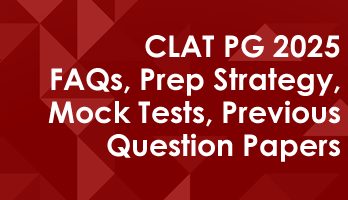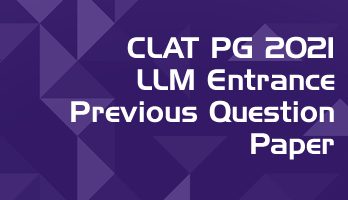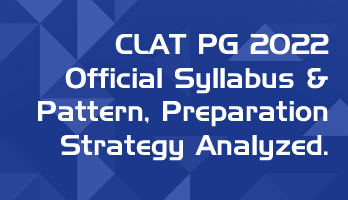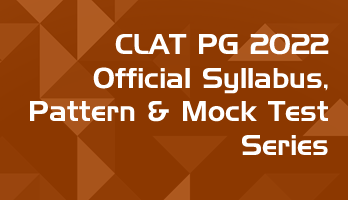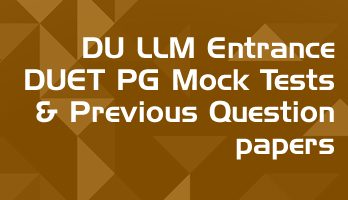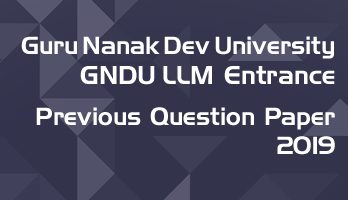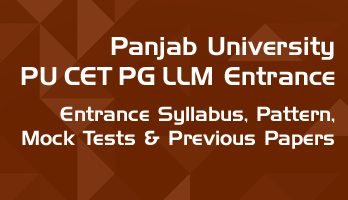The Andhra Pradesh State Council of Higher Education (APSCHE) conducts the AP PG Law Common Entrance Test for LLM – AP PG LCET every year for admission to the LLM courses in all the University affiliated and other participating colleges in Andhra Pradesh. (See the tentative list of participating Colleges and the available specializations included at the end of this post)
There are usually over 400 LLM seats available for aspirants through this competitive exam.
Note : Refer to the relevant articles on LawMint.com for syllabus and details of the current year’s admissions process.
Eligibility for admission to LLM courses through the AP PG LCET.
Candidates holding LL.B./B.L. degree on the date of application and candidates who have appeared/appearing for LL.B./B.L. Final year examination are also eligible.
A candidate appearing for LLB/BL degree examinations may take the AP PG LCET in anticipation of results. However the candidate shall have passed the qualifying examination with 50% marks in aggregate (for OC/BC) and 45% marks in aggregate (for SC/ST) at the time of counseling.
The candidate should be an Indian National and should satisfy Local / non-local status requirement as laid down in the Andhra Pradesh Educational Institutions (Regulation of Admissions) Order, 1974 and the amendments made thereto from time to time.
Centers of Entrance Test – APPGLCET
Anantapuramu, Chittoor, Tirupathi, Kadapa, Kurnool, Nandyal, Nellore, Ongole, Guntur, Vijayawada, Bhimavaram, Kakinada, Rajamahendravaram, Visakhapatnam, Vizianagaram, Srikakulam
However, Convener reserves the right to allot candidates to any other center(s) in unavoidable circumstances.
Medium of Entrance Test: The APPGLCET question paper will be in English only.
Test Paper Information: APPGLCET:
A Single entrance test is conducted for all the courses of LL.M. It is of 90 minutes duration and consists of 120 questions of 1 mark each.
Part-A consists of 40 questions (Jurisprudence 20, Constitutional Law 20; Total 40 questions of 1 mark each)
Part -B consists of 80 questions (public International Law 16,Mercantile Law 16, Labour Law 16, Crimes and Torts 16, and IPR & Other Laws 16)..
The Questions will be objective type including multiple choices questions, matching items. Each Question contains four alternative answers and candidates have to pick up the correct answer from among the choices given.
Qualifying marks in AP PGLCET-2017: The qualifying percentage of marks in the Entrance Test is 25%. (i.e. 30 marks out of total 120 marks). There will be no qualifying marks for S.Cs & S.Ts for ranking.
AP PGLCET-2017 Results:
a) Evaluation: Every care will be taken to avoid errors in evaluation, checking, scrutiny, tabulation and ranking. Hence, request for retotalling or revaluation or personal identification of scripts will not be entertained.
b) Ranking: The Candidates will be ranked as per the total marks obtained in the Entrance Test.
c) If there is a tie in total marks, the marks obtained in Part-A of Entrance Test will be considered for awarding the rank.
d) If the tie persists they may be bracketed together for the purpose of ranking and seniority in age may be considered at the time of admission.
e) The Candidates are advised to download the Rank Card from the web site www.sche.ap.gov.in/lawcet after one week of the publication of results.
In case of the any difficulty in downloading the Rank Card the candidates are advised to contact the Convener’s office.
SYLLABUS FOR AP PGLCET – 2017
The candidates should be thorough in jurisprudence, Constitutional Law, Public International Law, Mercantile Law, Labour Laws, Crimes and Torts, IPR and other Laws. However concentration should be on the following.
Part-A: 40 Questions : 40 marks
I) JURISPRUDENCE: 20 Questions – 20 marks
Schools of Jurisprudence – Sources of Law, Custom Precedent and Legislation, Rights and duties – Ownership and Possession, Persons, Obligation, Property, Liability, Legal Sanctions.
II) CONSTITUTIONAL LAW: 20 Questions – 20 marks
Nature of the constitution: Fundamental Rights, Directive Principles of State Policy, Executive, Judiciary and Legislature, Center-State Relations, Emergency provisions, Amendments to the constitution.
Part-B: 80 Questions – 80 marks
III) PUBLIC INTERNATIONAL LAW: 16 Questions – 16 marks
International Law and Municipal Law, Subjects, State Territory, Air, Sea and outer space, Nationality and Statelessness, Extradition, Asylum, State Jurisdiction, United Nations.
IV) MERCANTILE LAW: 16 Questions – 16 marks
General Principles of Contract (Sections. 1-75, Indian Contract Act-1872).
V) LABOUR LAW: 16 Questions – 16 marks
Trade Union Act 1926. Industrial Disputes Act 1947.
VI) CRIMES and TORTS: CRIMES: 16 Questions – 16 marks
Indian Penal Code – General Principles & General Exceptions. TORTS: General principles of Tort, , Defences, Joint liability, State liability for torts; Consumer Protection Act,1986
VII) IPR and OTHER LAWS: 16 Questions – 16 marks
Copyright Act, 1957; Patents Act, 2005; Environmental Protection Act, 1986; Human Rights,The Protection of Human Rights Act, 1993, Salient features of Information Technology Act, 2000 and Right to Information Act 2005.
The list of participating colleges in the AP PG LCET and the courses offered:
Dr. B. R. Ambedkar College of Law, Andhra University, Visakhapatnam
LLM (CONSTITUTIONAL AND LEGAL ORDER)
LLM (BUSINESS LAW)
LLM (INTERNATIONAL LAW AND ORGANISATION)
LLM (CRIMINAL LAW)
LLM (HUMAN RIGHTS LAW)
Mahatma Jyothirao Phule College of Law, Dr. B. R. Ambedkar University, Etcherla
LLM (BUSINESS LAW)
LLM (LABOUR AND INDUSTRIAL LAW)
LLM (CONSTITUTIONAL LAW)
Department of Law, Sri Krishnadevaraya University, Anantapuramu
LLM (CRIMINAL LAW)
LLM (CONSTITUTIONAL LAW)
Department of Law, Sri Padmavathi Mahila Viswa Vidyalayam,Tirupati (Women Only)
LLM (HUMAN RIGHTS LAW)
LLM (BUSINESS LAW)
LLM (LABOUR CAPITAL AND LAW)
P. G. Department of Legal Studies, Acharya Nagarjuna University, Guntur
LLM (LABOUR LAW)
LLM (LAW OF CRIMES)
P. G. Department of Law, Sri Venkateswara University, Tirupati
LLM (CONSTITUTIONAL AND LEGAL ORDER)
N. B. M. Law College, Visakhapatnam
LLM (CRIMINAL LAW)
LLM (INTERNATIONAL LAW)
All Saints Law College, Visakhapatnam
LLM (CONSTITUTIONAL AND LEGAL ORDER)
LLM (COMMERCIAL LAW)
Veeravalli College of Law, Rajahmundry
LLM (CONSTITUTIONAL LAW & ADMIN LAW)
LLM (LABOUR LAW)
Visakha Law College, Visakhapatnam
LLM (FAMILY LAW)
Dr. B. R. Ambedkar Global Law Institute, Tirupati
LLM (CONSTITUTIONAL AND LEGAL ORDER)
LLM (CRIMINAL LAW)
S. R. K. M. Law College, Chittor
LLM (LABOUR LAW)
LLM (INTELLECTUAL PROPERTY RIGHTS)
Sri Vijayanagar Law College, Anantapur
LLM (CORPORATE AND SECURITY LAWS)
LLM (CRIMINAL LAW)


